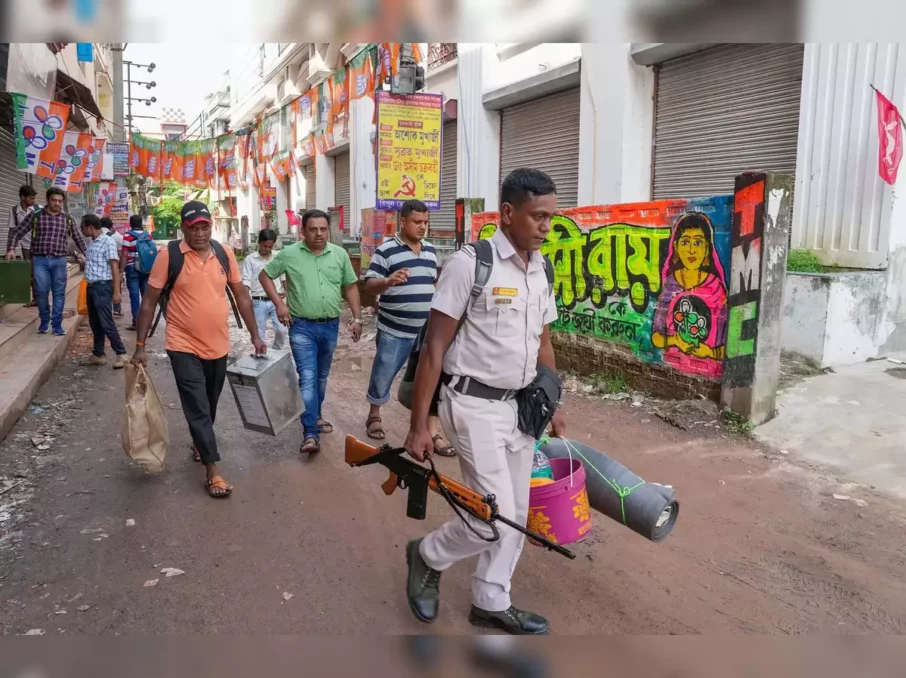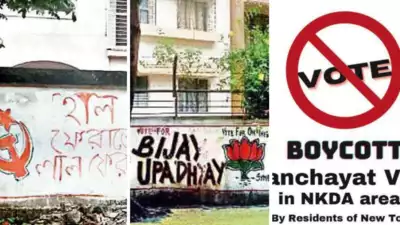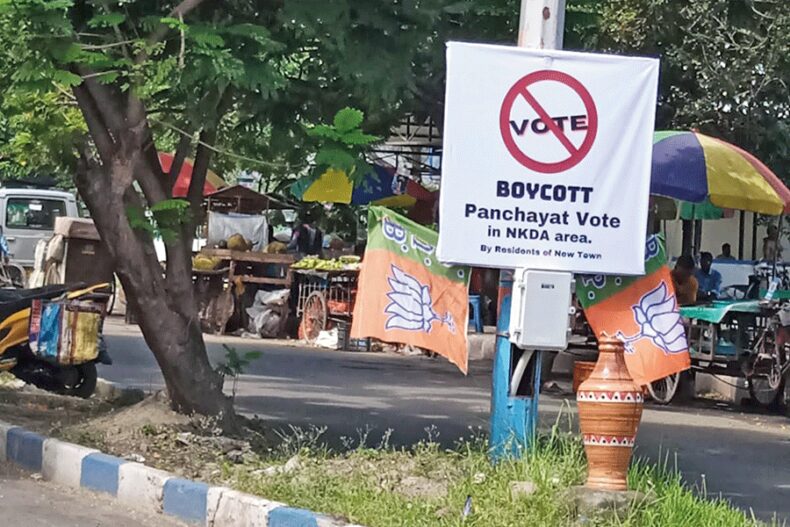Numerous voters in New Town, a neighbourhood on the outskirts of Kolkata, say that “goons” prevented them from casting their votes in the West Bengal panchayat elections because they tried to enter polling places there.

Elections for 73,887 seats in the state’s three-tier panchayat system were held on Saturday, with a total of 2.06 lakh candidates running. In the rural portions of the state, there were roughly 5.67 crore voters.
The 75-year-old retired academician stated he made two efforts to cast his ballot at the voting place, APJ Abdul Kalam College, but was turned away by a crowd.
They first stopped me at 8 a.m. With guard rails, many people blocked the roads leading to the polling place. I attempted to visit the booth once more at about midday, this time with a neighbour, but we were forced to turn around. The elderly guy added, “The people outside the polling place told us that our votes have been counted.”
The inclusion of the township in the panchayat area has long been opposed by some residents of the smart city, who have been protesting under the banner of the New Town Forum. Additionally, the forum had voted to abstain from voting.
Another group, however, expressed dissatisfaction with New Town’s inclusion in the panchayat but wished to vote to participate in the democratic process.
Voting in the panchayat elections was encouraged by several political groups, notably the Trinamool Congress, which is currently in power.
We witnessed the death of democracy, according to Samir Gupta, the secretary of the New Town Citizen’s Welfare Fraternity. Police barricaded around the APJ Abdul Kalam College and no one was permitted to access the voting booth.
He stated that criminals arrived on buses carrying bombs and firearms and drove us away.
Additionally, Gupta claimed that a scheme to cast fraudulent votes was behind the demand to boycott rural voting in New Town. A few citizens who were unable to cast ballots also shared videos on social media showing what they claimed to be police absence and obstruction at polling places. The head of the opposition New Town Forum, Samaresh Das, meanwhile, charged that the TMC was “using our boycott call to loot votes.”
Local CPI(M) leader Saptarshi Deb said that all polling places had access routes blocked and that he was unable to leave his house on Saturday.
According to him, there was a complete subversion of the democratic process in New Town, and under the guise of a vote boycott, individuals were prevented from exercising their right to vote.
Anindyo Sinha Roy, the local TMC leader, alleged that some miscreants prevented him from going to the nearby market.
“They never let anyone pass because they barricaded highways with boycott vote banners. No one was waving a political banner. The forum may have filed a police report if they believed the ruling party had violated their rights by utilizing the name of the platform, according to Sinha Roy.
According to reports, the township was a panchayat region with two members; however, after delimitation a few months ago, there are now eight delegates.
Violence During ‘Panchayat Polls’
As voting concluded in Bengal’s rural areas on Saturday, violence erupted, leaving 12 dead, polling machines vandalized, and competitors targeted with bombs in several communities.

The events on Saturday were consistent with the state’s history of violent elections, which includes the 2003 panchayat elections, which received attention for its 76 total deaths during the election process, including more than 40 on election day.
This year’s bloody election closely mirrored the 2018 panchayat vote violence trend, where 30 people have perished since polls were announced earlier last month.
Twelve persons have died since midnight in the important three-tier panchayat elections, including eight from the ruling TMC and one each from the BJP, CPI(M), and Congress.
Analysts consider this election to be a semi-final for the parliamentary elections in 2024, and it included scenes of ballot boxes being stolen and set ablaze as well as public ire directed at political figures.
5.67 crore voters, representing 73,887 seats in the state’s rural districts, cast their votes at 7 a.m. to determine the fate of almost 2.06 lakh candidates. 66.28 per cent of voters were registered as of 5 p.m., according to officials.
Rajiva Sinha, the state election commissioner (SEC), stated on Saturday that he will investigate claims of vote-tampering and decide whether to hold a second round of voting after hearing from observers and returning officers.












